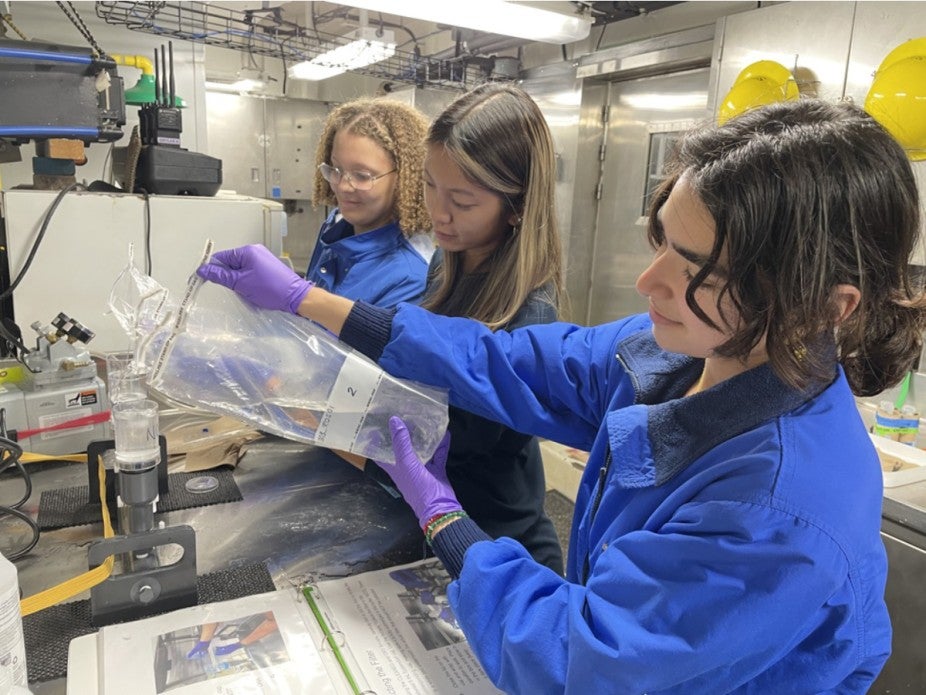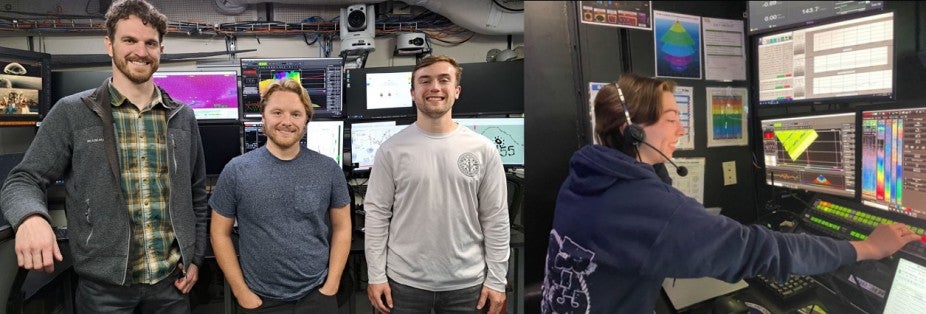NOAA Ocean Exploration Explorer-in-Training Program
Unfortunately, we will not be taking program applications for 2026.

As part of its mission to train the next generation of ocean explorers, scientists, engineers, and communicators, NOAA Ocean Exploration hosts students in the Explorer-in-Training Program. These interns gain valuable, interdisciplinary experience in ocean exploration while collaborating on office projects and expeditions. Explorer-in-Training internships enable students to increase their competitiveness for educational and career opportunities in ocean-related fields.

Explorers-in-Training Rebecca Ruiz, Rose Leeger, and Ranna Zahabi filter water samples for environmental DNA collection during the Seascape Alaska 2: Aleutians Deepwater Mapping expedition. Image courtesy of NOAA Ocean Exploration, Seascape Alaska.
NOAA Ocean Exploration is dedicated to exploring the unknown ocean, unlocking its potential through scientific discovery, technological advancements, and data delivery. By working closely with partners across public, private, and academic sectors, we are filling gaps in our basic understanding of the marine environment. This allows us, collectively, to protect ocean health, sustainably manage our marine resources, accelerate our national economy, better understand our changing environment, and enhance appreciation of the importance of the ocean in our everyday lives.
With priority placed on exploration of deep waters and the waters of the U.S. Exclusive Economic Zone, NOAA Ocean Exploration applies the latest tools and technologies to explore previously unknown areas of the ocean, making discoveries of scientific, economic, and cultural value. By making collected data publicly available in increasingly innovative and accessible ways, we provide a unique and centralized national resource of critical ocean information. And, through live exploration video, online resources, training and educational opportunities, and public events, we share the excitement of ocean exploration with people around the world and inspire and engage the next generation of ocean scientists, engineers, and leaders.
A core part of the NOAA Ocean Exploration mission is to train the next generation of ocean explorers through internship and fellowship opportunities for students and early career professionals. One of the many ways that the office addresses this goal is through a partnership with the Cooperative Program for the Advancement of Earth System Science (CPAESS), a community program of the University Corporation for Atmospheric Research (UCAR), to coordinate opportunities for students to gain valuable experience in ocean exploration.
About the Explorer-in-Training Program

[Left] Explorers-in-Training Cameron Kuhle, Dana Carris, and Brett Woodworth onboard NOAA Ship Okeanos Explorer. [Right] Explorer-in-Training Ingrid Martinson participates in mapping data collection in the control room aboard NOAA Ship Okeanos Explorer. Images courtesy of NOAA Ocean Exploration, Seascape Alaska.
Since 2009, NOAA Ocean Exploration and CPAESS/UCAR have hosted over 170 Explorers-in-Training. Last year we received a record 930 applications. The program equips participants with skills to meet the current and future demands of the ocean exploration workforce, providing meaningful experiential learning opportunities that support NOAA Ocean Exploration’s mission and inspire ocean literacy for the next generation. This year, the Explorer-in-Training program will feature two paid internship options: (a) 10-week, summertime opportunities and (b) 2-4 week expedition-based opportunities. The 10-week internships provide students an opportunity to develop their skills and knowledge through long-term projects supported by mentors in NOAA Ocean Exploration and partner organizations. The 2-4 week expedition-based internships involve participation in NOAA Ocean Exploration-supported expeditions aboard NOAA Ship Okeanos Explorer supporting seafloor mapping operations, giving participants the chance to contribute to mission efforts while gaining tangible skills that can benefit their future pursuits.
Internship themes available in 2025 are listed below, and additional details may be found on the Explorer-in-Training webpage. Applicants may only apply for one internship theme per year.
Internship Themes
-
Midwater ROV Annotations (10-week summer internship)
-
Emerging Technologies/eDNA (10-week summer internship)
-
Maritime Heritage Communications (10-week summer internship)
-
Science and Native Hawaiian Cultural Communications (10-week summer internship)
-
Ocean Mapping (2-4 week expedition-based internship)
Eligibility & Application Requirements
The 2025 Explorer-in-Training application is now open! Please see below for eligibility requirements and application instructions. Deadline is XXXX for the 2025 Summer Internships.
-
U.S. citizenship
-
Must be at least 18 years of age by internship or expedition start date
-
Students (undergraduate or graduate) who are currently enrolled in or recently graduated (within one year of graduation date) from an accredited academic institution
-
Degree, major, or intent to major in a field relevant to NOAA Ocean Exploration’s mission, including but not limited to: STEM (science, technology, engineering and math) fields, social sciences, communications, education, business operations/administration, and ocean policy/management
-
Willingness to learn and follow office policies and/or shipboard standard operating procedures
-
Clearance of a Special Agreement Check (SAC) upon acceptance into the program
-
Valid U.S. Passport (2-4 week, expedition-based ocean mapping internship only)
How to Apply
-
Submit online application form on Explorer-in-Training webpage, including the following:
-
Current resume or curriculum vitae (maximum 2 pages). If you have never created a resume or CV before, see resources and guidance from the Purdue Online Writing Lab.
-
Required short answer response to each of the following prompts:
-
Tell us where you are in your academic/professional path, and how ocean exploration fits with your long-term career and educational goals. (Maximum 250 words)
-
The Explorer-in-Training program is intended to be an experiential learning opportunity. For the internship theme you are applying for, what specifically interests you in the opportunity and what skills and/or experiences are you hoping to gain? (Maximum 250 words)
-
Describe a situation when you had to overcome a challenge or step outside of your comfort zone. How did you get through it and what did you learn? (Maximum 250 words)
- Question #4 has been removed from the application requirements. Applicants are no longer required to answer Question #4 in future submissions. Any responses to Question #4 already included in previously submitted applications will not be considered during the review process.
-
The following question is required for applicants to the 10-week Science and Native Hawaiian Cultural Communications internship only: Explain how you hope that your passion for and familiarity with Native Hawaiian culture, knowledge, and language will connect to local communities through this role. (Maximum 250 words)
-
-
Contact information for at least one professional reference (professor, advisor, work supervisor, mentor, etc.). References should be able to speak to your character and your professional and/or academic background.
Application Deadlines
Applications for the 10-week summer internship opportunities will be accepted until XXX. Applications for the 2-4 week expedition-based ocean mapping internship will be accepted on a rolling basis, with a priority deadline of XXX. After this priority deadline, applications will still be accepted until all slots are filled for the 2025 field season.
Informational Webinar
NOAA Ocean Exploration hosted a 60-minute virtual webinar for interested applicants. The session provided an overview of the Explorer-in-Training program, including available internship themes for 2025, eligibility and application requirements, important dates, and available resources. Registration for this event is now closed. The webinar recording is available below, along with responses to applicant questions submitted during the webinar and through the registration form.
Please visit the Explorer-in-Training webpage or see the attached flyer for more details. For questions and additional information, or if you experience technical difficulties, please contact NOAA Ocean Exploration Internship Program Coordinator at oer.internships@noaa.gov.
The Explorer-in-Training program is administered in partnership with the Cooperative Program for the Advancement of Earth System Science (CPAESS), a community program of the University Corporation for Atmospheric Research (UCAR).
Please ask your references for permission to include their information before final submission of your application.
Go to NOAA to Submit Your Application
If you have any questions, need guidance, or experience technical difficulties, please contact NOAA Ocean Exploration’s Internship Program Coordinator at oer.internships@noaa.gov.
We receive a large number of applications for our opportunities each year. Please consider the email copy of your Google Form application as your confirmation of receipt.